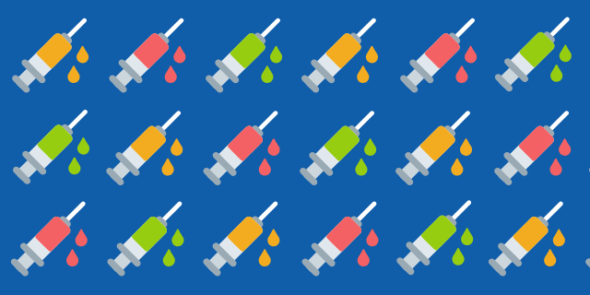
HPV is the most common sexually transmitted infection (STI), but sometimes it feels like it’s one of the least understood.
Most people who have human papillomavirus (HPV) don’t have any symptoms, and the virus goes away on its own. But in the cases where it doesn’t go away, some types of HPV can cause genital warts or lead to cancers in the cervix, throat, mouth, penis, anus, vulva and vagina.
The good news? There’s a vaccine that can keep you from getting the HPV strains that most often cause cancer and genital warts. Sometimes called Gardasil or Gardasil-9, the vaccine is recommended for all young people when they’re 11-12 years old.
The HPV vaccine is a powerful cancer prevention tool. But there’s still a lot of confusion and misinformation out there about it. As an Adolescent Medicine Fellow, I answer a lot of questions about the HPV vaccine from young people and their families. Here are answers to the six most common questions I hear.
1. Does it hurt?
The honest answer? Yes, a bit. Like with any shot, you’ll feel a pinch when the needle goes in and pressure in the area where the shot is given. Your arm may also feel a little sore after, but the pain doesn’t last long.
2. How safe is it?
People often think that since the HPV vaccine is relatively new, there’s not as much known about it. But before any vaccine is approved by the FDA, it goes through thorough testing, and studies show that it is very safe.
It has the same side effects as other vaccines. Many people don’t have any side effects, aside from some pain and redness when it’s given. Others may feel dizzy or nauseous, or pass out. Again, these are the same side effects as other vaccines.
3. Why do I have to get it even though I’m not having sex?
Since the vaccine prevents HPV, it’s important to get it before you might be exposed to it. As I’ve already mentioned, HPV is very common, and it’s easy to get HPV the first time you have oral, anal or vaginal sex. Barrier methods like condoms help prevent the spread of HPV, but don’t completely get rid of the risk. This means you should get the HPV vaccine before you have sex of any kind. Even if sex is the furthest thing from your mind right now, the HPV vaccine is still for you.
Plus, if you get the HPV vaccine when you’re 9-14 years old, you only have to get two shots. If you get the HPV vaccine after you turn 15 years old, you’ll have to get three shots. This means it’s a good idea to not put it off!
Some parents get worried that vaccinating their children will give them the idea that it’s ok for them to have sex. But studies show that getting the HPV vaccine has no effect on when teens make their sexual debut.
4. How are the HPV vaccine and Pap smears related?
It’s all about prevention versus screening. The HPV vaccine keeps you from getting (certain strains of) HPV in the first place. A Pap smear is a screening tool, used to check if you already have abnormal cervical cells or HPV. Unlike the vaccine, Pap smears have no effect on whether you get HPV in the future.
5. Does everyone have HPV?
Not necessarily everyone… but close to it. Is it the end of the world? No. There are over 100 strains of HPV, and only a handful are likely to cause health problems. Most of the time, HPV will go away on its own with no symptoms, and you never know you even had it. This is why if you have an abnormal pap smear, your health care provider will usually ask you to go back for a second. Often, HPV is gone by then.
It’s still important to get the vaccine though! That’s because it protects against the nine strains that are most likely to cause health problems.
6. Why do boys have to get it?
This question usually comes from parents and not my actual patients. Even though most people associate HPV with cervical cancer (for good reason), the vaccine also helps prevent cancers in the penis, mouth, throat, rectum and more. It also helps prevent genital warts, which may not be as serious but are definitely NOT fun!
Plus, even though there’s no medical HPV test for people with penises, they can still be carriers of HPV and spread it to people with vaginas. This means that in order to prevent the spread of HPV, it’s important for people of ALL genders to get vaccinated.
Learn more about why boys should get the HPV vaccine.
10-22 years old in NYC? Get the HPV vaccine and other comprehensive health care for free at the Mount Sinai Adolescent Health Center. Call (212) 423-3000 to make an appointment.
Dr. Nathalie Duroseau, DO, our first year fellow, completed her residency at Sidney Kimmel Thomas Jefferson University/ Nemours A.I. DuPont Children’s Hospital after receiving both her doctorate in Osteopathic Medicine and a master’s degree in Neuromuscular Sciences at NYIT College of Osteopathic Medicine, Old Westbury, NY. She also received her bachelors in Sociology at New York University. Her particular areas of interest include reproductive health, improving health literacy in adolescents through the use of technology and social media tools, PCOS, and substance abuse among adolescents.
The Mount Sinai Adolescent Health Center is located in New York City. It provides comprehensive, confidential, judgment free health care at no charge to over 12,000 young people every year. This column is not intended to provide medical advice, professional diagnosis, opinion, treatment or services to you or to any other individual, only general information for education purposes only.


